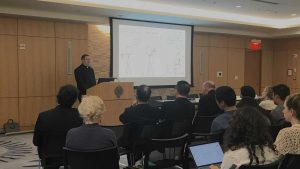By Julia Rist

Fordham University students had the opportunity to learn more about the school’s Jesuit roots at “Comets, Craters and Calendars: Christopher Clavius, S.J. (1538 – 1612),” a lecture and panel discussion on the life and scientific findings of Clavius.
The event took place as part of the university’s Ignatian Week, a week-long series of events sponsored by Mission Integration and Planning and Campus Ministry. The week aims to promote Fordham’s Jesuit mission and help students learn more about what it really means to be a Jesuit.
Dozens of students filled the seats of Bepler Commons to learn more about the life and mathematical contributions Clavius had on society.
Michael C. McCarthy, S.J., the vice president for Mission Integration and Planning, said it is very fitting that this discussion is taking place at the beginning of Ignatian Week.
“Clavius’s influence on modern-day sciences ranges from well-known achievements such as the Gregorian calendar to other lesser known developments such as his influence on scientific innovations in China,” McCarthy said.
He told students that Pope Gregory XIII established the Vatican Observatory, one of the oldest and most significant astronomical observatories the world, in 1580 in response to Clavius’s work.
“The observatory was built to confirm and find many of Clavius’s findings within the Gregorian calendar,” said McCarthy.
Paul Mueller, S.J., the superior of the Jesuit Community at the Vatican Observatory in Castel Gandolfo, Italy and in Tucson, Arizona gave the event’s keynote address. Mueller stressed that Clavius did not play an active role in scientific innovations in the 17th century but still managed to shape them greatly.
“Through his many years of teaching at the Jesuit Roman College and through his widely used textbooks in astronomy and mathematics, he was influential in the training and preparation of those who would go on to be the discoverers and innovators of the scientific revolution,” Mueller said.
Mueller said Clavius also introduced reforms to the educational system that elevated the study of mathematics and introduced a more intensive curriculum to the school.
“The effect was to produce students who were more capable of math and who had a new and different appreciation about how mathematics might connect to physics and other sciences,” Mueller said.
Mueller argued that these reforms helped Clavius cement his place in history books.
“In my opinion, this was Clavius’s most important long-term legacy as teacher, as teacher of teachers, as a developer of textbooks in mathematics and astronomy, which were used all over the place and as a developer and innovator of curricula in mathematics,” Mueller said.
Mueller said that Clavius had many generations of students that promoted his ideas and strived to further integrate the subjects of math and science.
One of Clavius’s most famous students, Matteo Ricci, translated his books into Chinese. These books helped influence scientific development in China.
Clavius also had a prominent role in reforming the calendar under Pope Gregory XIII. Clavius wrote a book, “Romani calendarii a Gregorio XIII P.M. restituti explication,” which explained the calendar to the public.
Part of the reason that the Gregorian calendar was so important was because people would be able to know the correct date of Easter Sunday, according to Mueller.
“If you lived in a world where everyone knows it’s a mortal sin to miss going to mass on Easter and if you lived in a world where if you die without confessing your mortal sins then you’re going to burn in hell, this is an existential question,” Mueller said. “You want to know the right day for Easter.”
Mueller said there is a distinct and undeniable connection between Christianity and science throughout all of Clavius’ teachings.
Maura Mast, Ph.D., the dean of Fordham College Rose Hill, said Clavius has been deeply influential on her study of geometry, how she views herself as a teacher and her faith.
Mast said it is important to train mathematic teachers well because these teachers can help students not only get better at the particular formulas, but also better participate in our democracy.
“My conviction is that everyone can learn mathematics and that everyone should learn mathematics,” Mast said.
Mast, a member of the Clavius Mathematics group, said Clavius has had a profound impact on her life. She said being a part of this organization is a great way to bring her spiritual life and her professional life together.
“Clavius brings us into the presence of the divine, with our math, with our time together as a community,” Mast said.
Ignatian Week runs until Oct. 6.












































































































































































































